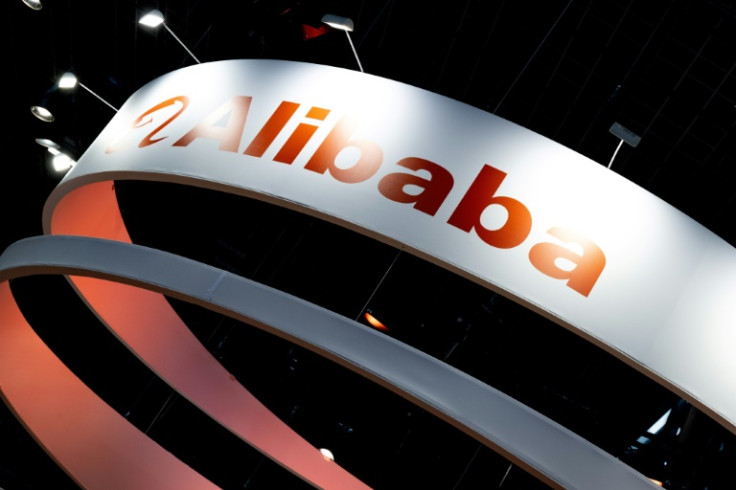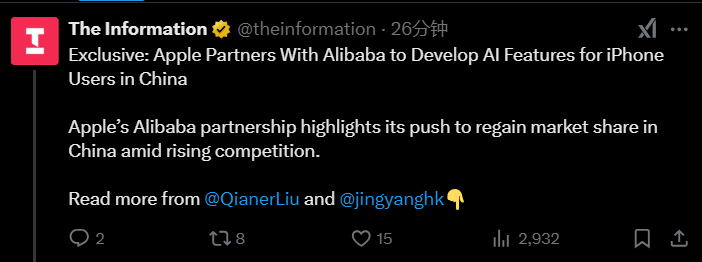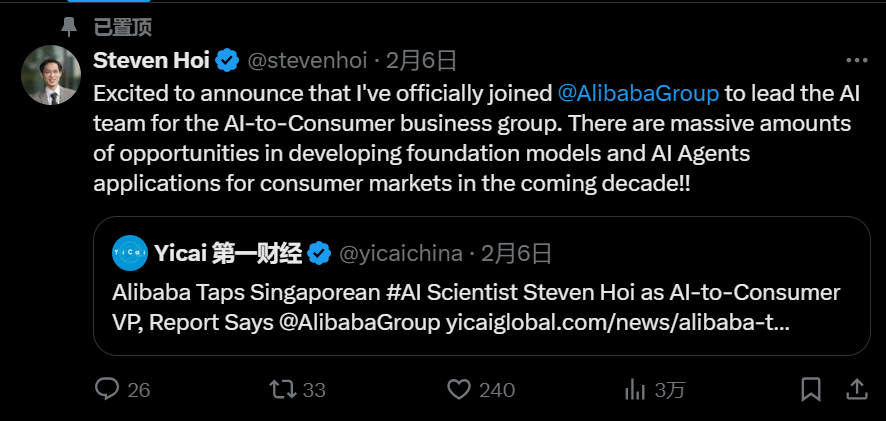Alibaba and Apple Collaborate, AI Emerges as Alibaba's "Next Curve"
![]() 02/19 2025
02/19 2025
![]() 688
688

On February 11, US Eastern Time, Alibaba's stock price hit a four-month high, peaking at $115.54. Since its low point on January 13, Alibaba's share price has surged over 40%.
The event that most closely coincides with the beginning of Alibaba's upward trend is the global popularity of DeepSeek. The old BAT trio all experienced lows on January 13 (due to US AI chip restrictions), followed by a collective rebound as DeepSeek's popularity countered the chip-centric narrative. During this period, NVIDIA's stock also plummeted (but is gradually recovering). The new perspectives brought by DeepSeek are temporarily reshaping the valuation logic of the global AI industry.
Among BAT, Alibaba boasts a relatively stable e-commerce business as its foundation. Riding this wave of attention, the market's confidence in Alibaba during this period may be primarily fueled by its established AI businesses, such as Alibaba Cloud for B2B, Quark for C2C, T-Head for upstream, and its technological prowess at the model level. However, none of these have truly presented the market with a unique vision exclusive to Alibaba. Before DeepSeek, Alibaba was already on this trajectory.
To foster a new vision, it is essential to start with Alibaba's weaknesses in AI. In fact, in 2024, exemplified by the development of the Tongyi app, not all of Alibaba's AI-to-C businesses were smooth sailing. Over the past period, Alibaba's new layout in its AI-to-C business has precisely targeted its former "blind spots" – making timely adjustments in business focus, structure, and personnel.
Just as these adjustments were being made, but had yet to be fully recognized by the market, Apple quietly added another layer of "positive momentum." Before the market opened on the 11th, The Information reported that Apple and Alibaba had forged a partnership to develop AI features for Chinese iPhone users. Following the news, Alibaba's stock price continued to climb throughout the day, closing at $112.78.

Over the past year, the highly anticipated question of "who in China will secure Apple's AI orders" remained unanswered. For the domestic AI industry, this represents a pivotal juncture. For Alibaba, it signifies that the AI-to-C business may officially become its highly imaginative "next curve."
After all, to sustain the market's confidence in its AI business, Alibaba cannot solely rely on its existing offerings.
01. Restructuring the AI-to-C Architecture
A previous article in "New Position" titled "The Year Tongyi To C Was 'Sidelined'" mentioned a viewpoint that Alibaba's previous architecture had predetermined the lack of a highly coherent layout for its internal AI-to-C business over the past year. Apparently, by 2025, Alibaba is aiming to create this coherence.
In mid-January, Alibaba's primary AI-to-C (including agents) business was consolidated and placed under the responsibility of Wu Jia, despite the previously "uneven" development of these businesses.
The "Intelligent Information" business encompasses Quark, the Tongyi To C team (recently transferred from Alibaba Cloud to Intelligent Information at the end of the year), UC Browser, etc. Quark's achievements last year were evident; according to Qimai data, it surpassed ByteDance's Doubao to become the top-downloaded AI app of 2024. As for the Tongyi app, as previously analyzed in "New Position," it was "sidelined" over the past year, missing out on the top three chatbots of 2024.
On the other hand, Tmall Genie can be considered Alibaba's most emblematic hardware "Agents" business and the core of the "Intelligent Connectivity" business group. On January 16, according to "Intelligent Emergence" news, Alibaba handed over the Intelligent Connectivity business group to Wu Jia, president of the Intelligent Information business group, for unified management. Moreover, the hardware team of Tmall Genie is already integrating with the Quark product team.

Some core AI-to-C products are also scattered across other architectures. For instance, DingTalk, which operates independently, ranked fourth in AI app downloads last year. The top four AI products hailed from Alibaba-ByteDance-ByteDance-Alibaba. Last year, Alibaba and ByteDance were locked in a "tight race" in AI-to-C applications.
The current uneven development of these businesses stems from the fact that not all of them occupied a favorable market position before the era of large models exploded.
For instance, Alibaba's relatively mature AI-to-C businesses include DingTalk and Quark. These two products had already amassed considerable business ecosystem richness and product strength long before the era of large models, and they are already leading products in their respective fields, warranting higher autonomy. Perhaps for this reason, the AI large model behind Quark was previously self-developed by Quark, while DingTalk even broke away from the "Cloud & DingTalk" integration in 2023 to focus on its own business.
However, Tongyi's C-end can be considered a product entirely born in this era. Previously attached to Alibaba Cloud, it later came to an organizational structure parallel to Quark, serving as a crucial yet still-improving business. As for the entire smart home interconnectivity industry where Tmall Genie resides, a previous article in "New Position" mentioned that this field has always been dominated by home appliance giants.
Previously, "New Position" also expressed a viewpoint that when large companies had well-developed cloud businesses with high market share before the explosion of large models, the influence of their flagship large models and newly launched To C products would be relatively overshadowed. Judging from the C-end journey of Tongyi, C-end products might even be somehow "constrained" by cloud businesses.
Therefore, to further develop AI-to-C (including Agents) related businesses, Alibaba needs a thread that can reasonably connect AI-to-C businesses, link them with cloud businesses, and preserve the autonomy of mature and upcoming businesses.
After the Spring Festival holiday, with the start of work and a new round of personnel changes in enterprises, Alibaba welcomed this "thread."
02. Balancing Technology and To C Products
On February 6, China Business News reported that Alibaba had hired Singaporean AI scientist Steven Hoi as Vice President of AI-to-C. Steven Hoi himself also confirmed and pinned the source:

According to self-media Shen Xiaofei, Steven Hoi joined Alibaba before the Spring Festival and reports to Wu Jia, Vice President of Alibaba Group and President of the Intelligent Information Business Group.
Additionally, Jiemian News reported that Steven Hoi is responsible for the multimodal fundamental models and Agents-related fundamental research and application solutions for the AI-to-C business, enhancing Alibaba's end-to-end closed-loop capability in model-application integration for its AI C-end products.
In summary, Steven Hoi's position within Alibaba's organizational structure is most likely that of Vice President of Intelligent Information, reporting to Wu Jia, President of Intelligent Information; his responsibilities can be encapsulated as "fundamental model/solution construction" for Alibaba's AI-to-C and Agents-related businesses.
Combining the personnel changes in mid-January with the previous organizational structure and development status of Alibaba's AI-to-C business, this arrangement now also signifies that Alibaba's current business sorting in this area is clearer – Alibaba's primary AI-to-C and Agents businesses have been consolidated, requiring a role to link and balance the technical and product ends. Therefore, the business division of "fundamental model construction" for AI-to-C and Agents is indeed a fitting answer.
Once established, this team will serve as an intermediary role, an "internal business model platform," to balance the technical end with the AI-to-C and Agents application ends, as well as mature and immature businesses.
Steven Hoi's previous experiences align well with Alibaba's current needs in this area. It is reported that he once served as Vice President of Salesforce, the world's largest enterprise software vendor, and Founding Dean of its Asia Research Institute, leading multiple AI research projects and application products.
03. Preparing to Expand Agents Business
As of now (February 12), neither Apple nor Alibaba has responded to the rumors of their collaboration. However, public opinion and the market have already affirmed the rationality of this cooperation. Many insiders have been aware for some time that Alibaba is indeed the best fit for Apple's AI needs in China.
From Apple's perspective, it seeks technological prowess, caution with data security, a vision for AI and its ecosystem, and sufficient service capabilities, all of which Alibaba possesses. From Alibaba's perspective, the statement "no one wants to miss out on Apple's orders" is too vague. The core significance of securing Apple's orders lies in contributing an AI-to-C hardware cooperation paradigm and benchmark case for Alibaba internally and for the industry.
For Alibaba, its most representative AI-to-C hardware business is Tmall Genie, which was just integrated into Quark as mentioned above. Collaborating on AI features with the world's top To C hardware products will naturally benefit Tmall Genie's business and may even open up more AI-to-C hardware ventures.
The AI functionalities required for AI-to-C hardware encompass not only generative capabilities but also Agents-related functions, which the industry generally considers one of the most imaginative To C implementation directions for the AI industry next.
Over the past two years, the AI-to-C hardware direction has been in a state of "chasing trends but lacking benchmarks." From the buzz around AI phones a year ago to the integration of DeepSeek into various new energy and mobile phone applications today, it is evident that there is still considerable uncertainty regarding implementation directions.
In fact, the biggest challenge in Agents implementation currently does not lie in technology. A previous article in "New Position" titled "Service + Agent, 'Zhi Xiaobao' Reconstructs Alipay" mentioned a viewpoint: the biggest pain point for users of AI Agents is the diversity, completeness, and interconnectivity of services within the ecosystem.
Whether it's AI phones or new energy vehicles integrated with large models, if they are within the same interest entity's ecosystem, Agent commands will certainly flow smoothly. However, if AI assistance is limited to the same ecosystem, the efficiency gains for C-end users' work and life cannot be considered a qualitative leap. Cross-interest entity Agent commands, on the other hand, involve "agreements" among all stakeholders.
What AI-to-C hardware currently lacks is precisely this cooperative "agreement" paradigm that connects multiple ecosystems. In China, Alibaba and Apple are an optimal duo to research this "paradigm," and some even believe that this combination is more imaginative than that of OpenAI and Apple.
Apple boasts a hardware ecosystem spanning multiple scenarios including work and home, and in the future, it cannot be ruled out that Apple may even venture into car manufacturing. Alibaba, on the other hand, has a partner ecosystem spanning almost all scenarios for C-end users, including entertainment, local life, office, e-commerce, etc. The philosophy of "making it easy to do business anywhere" is also invaluable at this juncture when AI Agents need interconnectivity.
Of course, these are somewhat distant future considerations.
*The lead image and images in the text are sourced from the internet.








